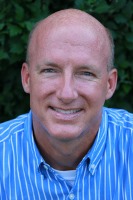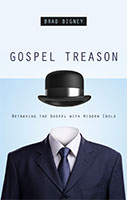Brad Bigney is the senior pastor of Grace Fellowship Evangelical Free Church in Florence, Kentucky. He is an ordained minister in the Evangelical Free Church of America. He is also a member and certified counselor of the National Association of Nouthetic Counselors and a member of the Association of Biblical Counselors. We were interested in the pastoral concerns addressed in his 2012 Gospel Treason: Betraying the Gospel with Hidden Idols (P&R, 2012), and so we contacted him and were pleased that he was able to speak to our readers here at Books At a Glance.
Books At a Glance (Fred Zaspel):
What was the context that first stirred your interest and desire to write this book?
Bigney:
The subject of idolatry more than any other has been one of the great awakenings in my life. My salvation was first, followed by an understanding of the sovereignty of God over all things, followed, several years later, by an understanding of the idols of my own heart. This was a major breakthrough for me in understanding why I do what I do, and why it’s so hard to consistently put to death certain sins. And the breakthrough came in the context of wrestling through a terrible marriage even while I was serving as full-time pastor.
You see, when you start addressing idolatry, you’re getting after the sin beneath the sin. Idolatry focuses on the heart motivations as to why you do what you do. And most of us live blind to this and self-deceived because Jeremiah 17:9 says the ‘heart is deceitfully wicked and who can know it?’ A biblical understanding of idolatry dramatically changed my life and exposed how far I had drifted from the gospel. Over twenty years ago, an understanding of idols of the heart was a major breakthrough in my own marriage struggles, and the things that I learned about my own heart not only changed my marriage but also transformed the way I approach life and ministry.
Books At a Glance:
How much counseling do you do on a weekly basis, and how has that experience helped to shape this book? Or have you been able successfully to integrate your book into your counseling sessions?
Bigney:
As a pastor and certified ACBC counselor (Assoc. of Certified Biblical Counselors www.biblicalcounseling.com), I’ve counseled hundreds of hours each year, for the past twenty years, and the issue of idolatry (or ‘why do I really do what I do?’) is consistently at the heart of most people’s struggle because it has to do with why we can’t seem to really change long-term. That’s because the heart of the matter is the matter of the heart. What’s going on in your heart – what you’re prizing, treasuring, protecting, and building your world around is really what drives you.
For years I used the little booklet by Ed Welch, titled, ‘Motives – Why Do I Do the Things I Do?’ but now I can use Gospel Treason that goes into much more detail as to how to identify and repent of idolatry in the heart.
 Books At a Glance:
Books At a Glance:
Do you have opportunity often to counsel unbelievers? If so, how does that affect your approach?
Bigney:
Yes and no. I personally don’t counsel many unbelievers because I’ve asked our counseling team to assign me mostly people from our own church family. As the senior pastor, I feel called to first meet the needs of our own church members. That being said, I still end up counseling many unbelievers because so often in counseling it becomes evident that the person being counseled may have made a profession of faith, and claim to be a Christian, but they really have never been converted by God’s grace to walk in a living relationship with Jesus Christ. So, yes, I do end up counseling unbelievers regularly. Our counseling team also has many opportunities to counsel unbelievers, as we are an official counseling center and offer free biblical counseling. In fact, when we have a waiting list, we’ve made unbelievers a priority over counseling people from other churches in the community.
Books At a Glance:
In your experience does the counselee typically lack understanding of the gospel? Do problems stem merely from lack of understanding?
Bigney:
Yes! We are finding more and more that the people who come to us for help, claiming to be Christians, are in fact still unconverted. Most often they have confused raw regulations (trying to follow a ‘list’ of Christian behavior) with a real relationship with Christ by grace. We also see a high number of people that do not really have a grasp of justification by faith alone, through grace alone. Therefore, their effort to live the Christian life is driven by their own strength which is futile. We are certainly ready and willing to counsel people with real issues with which they’re struggling but part of the counseling almost always involves teaching or re-teaching sound doctrine because doctrine does matter. What you believe will ultimately determine how you behave.
Books At a Glance:
If there is deficient understanding of the gospel, how do you advise the counselee to move forward in this regard, specifically in relation to progress in practical godliness?
Bigney:
We often take as many as six sessions to explain the gospel and help the counselee to wrestle with whether or not they are in a living John 15 (‘I am the Vine, you are the branches… apart from Me you can do nothing.’) relationship. If they are still dead in their trespasses and slaves to sin there’s really no reason to rush forward with trying to change thinking or behavior.
Books At a Glance:
Given your counseling background, nouthetic counseling, and your comments/conclusions regarding panic attacks what are your views on medicine in relationship to your counseling and how do you strike a balance?
Bigney:
As a counselor, I am compassionate and long to see suffering eased in any person’s life. We are not just trying to sniff out sin and shout at it with a Bible verse. We want to relieve suffering whenever possible. Therefore, while I believe medicine is almost never the total solution, I am not opposed to someone using medication prescribed by their doctor or psychiatrist if it enables them to move forward and function well enough to get further counseling to dig into what’s going on in the heart. Medication never addresses the heart, and so, except for organic issues (like low blood sugar, thyroid, etc.) it should rarely be seen as the final solution. A great book that presents a compassionate and balanced view on the use of medication in counseling is Dr. Charles Hodge’s book, Good Mood, Bad Mood. Charlie is a medical physician as well as a certified biblical counselor with ACBC.
Also, it’s never appropriate for me to counsel someone to get off of their medication. I am not a physician; I am a biblical counselor. What we do see, however, is that oftentimes people who begin to find real hope through biblical counseling take steps on their own to work with their doctor to reduce or eliminate the medications they were taking.
Books At a Glance:
What kind of response have you received in regard to this book and its view on counseling?
Bigney:
So far the response has been fantastic. People have contacted me, letting me know that God has used this book as a real breakthrough in their lives. Many say it has enabled them to really understand the nature of their struggle, so that they can get a level of freedom they’ve never had before. The book is very personal and hard-hitting, so many people have also said the book was hard to read but produced great fruit in their lives.

